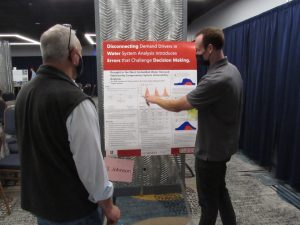
The Alabama Water Institute recently welcomed Dr. Ryan Johnson as a postdoctoral researcher.
Johnson earned his Ph.D. in civil and environmental engineering from the University of Utah. His dissertation research took advantage of artificial intelligence and machine learning to improve snowpack-dependent urban water systems’ resilience, reliability and vulnerability in a changing climate.
“This ongoing work characterizes urban water system demands as a function of external drivers, such as precipitation, air temperature and irrigated area, to improve the understanding of a water system response to surface water availability, particularly during supply-limiting drought conditions,” Johnson said.
Raised in Southern California, Johnson took a strong interest in water and the role it plays in shaping an area known for its dry and water-scarce characteristics. Summers spent camping and fishing in the Sierra Nevada mountains ignited his interest in the engineering side of water resources management, most notably the extensive land grab and interbasin development of the Los Angeles Aqueduct.
“The benefits and impacts of this project indicate that we as a nation need to advance the technology and management of our water resources to better benefit society, underrepresented groups and environmental resources,” he said.
Johnson joined AWI because he sees The University of Alabama establishing itself as a national leader in water research. The University is strengthening its ties to federal partners, such as the National Oceanic and Atmospheric Association and the U.S. Geological Survey, in order to advance national water security, forecasting, quality and management.
Within the first week of arriving at AWI, Johnson’s poster presentation won second place at the Alabama Water Resources Conference and Symposium in Orange Beach. His topic was on how interdisciplinary collaboration provides an unrivaled research product, and it was based on a climate vulnerability project he is working on with Salt Lake City, Utah.
“My team of engineers, climate scientists and hydrologists presented how the characterization of supply and demand, driven by this year’s megadrought, is critical to quantifying water system performance,” Johnson said. “This methodology departs from the overarching concept that demand is embedded in stationarity, establishing a new standard in urban water system vulnerability assessments.”
Johnson’s future research projects will expand the operations of national-scale streamflow forecasting tools. He will continue working on the Salt Lake City project and will utilize AWI’s relationships with federal and state partners to further his water management research at UA.
“The University’s close ties to NOAA, the USGS and others offers the opportunity to propose impactful research concepts that can take my niche regional work and expand to the national scale,” he said. “These projects also demonstrate the potential to give back to the community and advance forecasting tools to help prepare for climate and weather extremes.”
